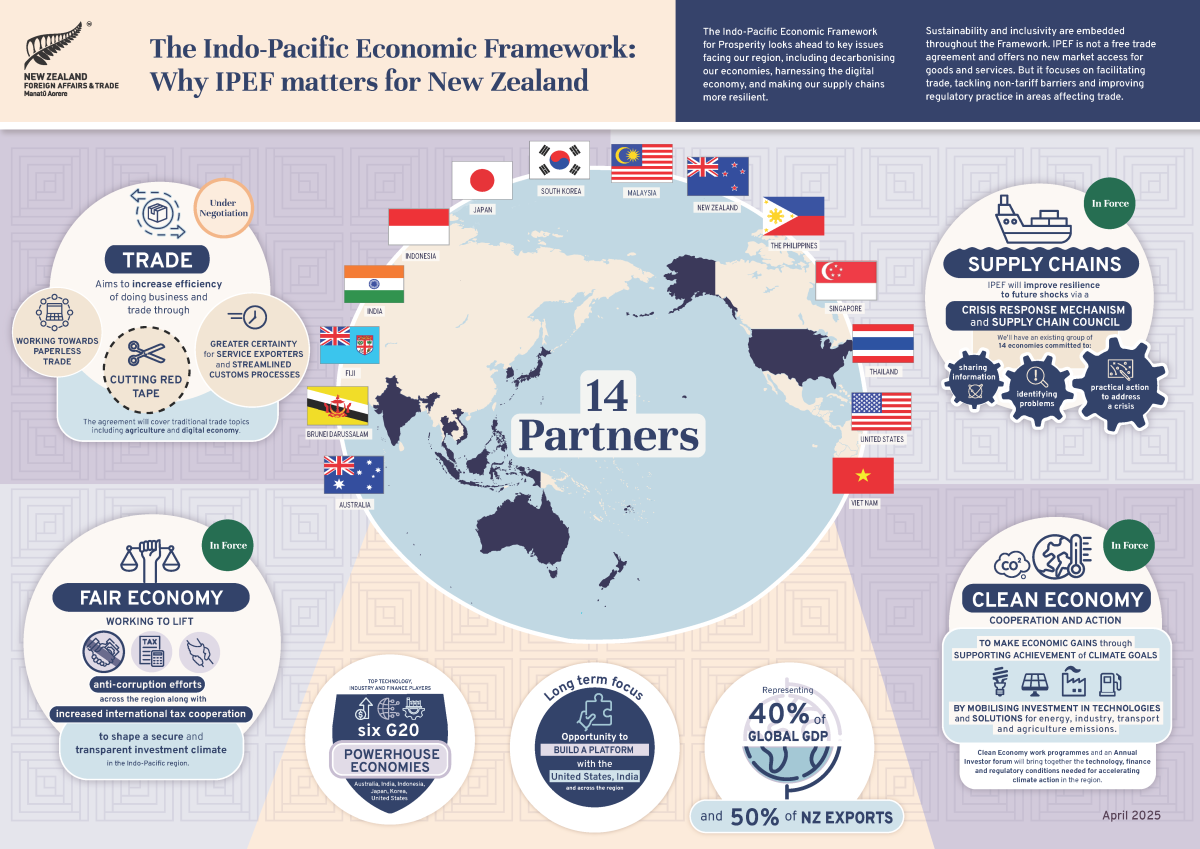Indo-Pacific Economic Framework for Prosperity (IPEF) overview
The Indo-Pacific Economic Framework for Prosperity (IPEF) is an economic framework that drives cooperation, investment, and economic integration across the Indo-Pacific. IPEF comprises four pillars with distinct areas of focus, and an overarching agreement:
- Pillar I (Trade) – negotiations on the trade pillar have not concluded;
- Pillar II (Supply Chains);
- Pillar III (Clean Economy);
- Pillar IV (Fair Economy); and
- The Agreement on IPEF.

Overview
On 23 May 2022, 14 Indo-Pacific countries, including New Zealand, announced the start of talks toward launching negotiations on the Indo-Pacific Economic Framework for Prosperity (IPEF). The Joint Leaders statement on the proposed initiative can be read here: Statement on Indo-Pacific Economic Framework for Prosperity | The White House.
IPEF membership includes 14 countries from across the Indo-Pacific. These are Australia, Brunei Darussalam, Fiji, India, Indonesia, Japan, the Republic of Korea, Malaysia, New Zealand, the Philippines, Singapore, Thailand, the United States, and Viet Nam. This grouping accounts for roughly 40% of global GDP and takes 50% of New Zealand’s exports.
IPEF includes four pillars with distinct areas of focus, and an overarching agreement:
- The Trade Pillar (Pillar I) seeks to develop new and creative approaches to trade and technology policies that fuel economic activities and generate investment;
- The Supply Chain Agreement (Pillar II) focuses on improving the resilience of supply chains across the region, including by establishing a crisis response mechanism;
- The Clean Economy Agreement (Pillar III) focuses on climate action at a regional level, including through the facilitation of green investment flows;
- The Fair Economy Agreement (Pillar IV) seeks to improve the business environment in IPEF markets by addressing corruption, reinforcing rule of law and improving transparency in tax administration; and
- The Agreement on IPEF establishes an IPEF Council at ministerial level to oversee the full IPEF architecture and work programmes.
Negotiations concluded on the Supply Chain Agreement in May 2023, and on the Clean Economy Agreement, Fair Economy Agreement, and Agreement on IPEF in November 2023. Negotiations on the trade pillar have not concluded.
The Supply Chain Agreement, Clean Economy Agreement, and the Fair Economy Agreement entered into force for New Zealand on 12 October 2024. The Agreement on IPEF entered into force for New Zealand on 11 November 2024.
The agreements do not apply to Tokelau, the Cook Islands, or Niue.
Texts for the IPEF agreements can be accessed through the IPEF statements and resources page.

